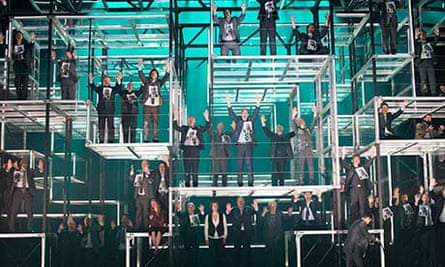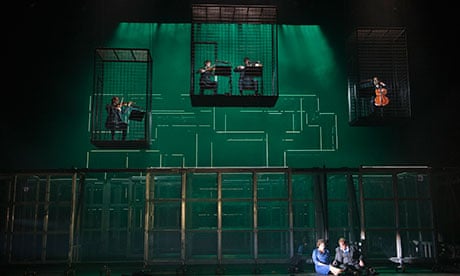Fidelio feels to me an unfinished opera. The music is extraordinary - I know every note of it by heart, but the libretto Beethoven used is weak, because of its conventionality. It's a very simple story, of Leonora who frees her husband Florestan from prison. As I turned my thoughts to directing the opera on stage for Bavarian State Opera last year, and now, bringing the production here to London, I wanted to provoke my audience to think about the ideas that are in the piece.
So my approach was a philosophical one. I have created a poem from both the dramaturgy and Beethoven's music. I wanted first to focus on what the piece means and create a show that asks questions. What does justice mean today? What does freedom mean? What does love mean, what does hope mean? And finally what does democracy mean in today's Europe?
I was very influenced by both Orson Welles's film of Kafka's The Trial, and by Borges's idea of the infinite labyrinth that you can't escape from. Our set is a labyrinth. It's based on these new skyscrapers of glass and mirrors that you are building so many of in London. These places are strange prisons - the idea of transparency they supposedly embody is an illusion, the people who work within them are trapped. Who is really in control in these transparent towers, who is really making decisions?
All the characters in our story, not just the imprisoned Florestan, are lost in this labyrinth, trying to find its centre. It's like Borges says in a text I use in the piece: (I have replaced most of the spoken text of the original with Borges and with Cormac McCarthy) in this labyrinth, there is no Minotaur, there is no way out, there is no end.
The show starts with the Beethoven's most powerful overture of the four he wrote for the opera - Leonore no 3. At 15 minutes, it's extremely long, but it allows us the space to start with a kind of poem, to make the audience reflect.
And then I thought I'd like to put another piece in the second half to balance with the first. I chose Beethoven's opus 132 string quartet, the first 10 minutes of the third movement. This is one of my favourite pieces of music: I use it here to express the loneliness that Florestan and Leonore feel after they are reunited. In my mind, I had the image of the string quartet flying in cages, so that's what I've made happen on stage. The four players of the Heath Quartet are in individual cages suspended above the stage. They play after the duet between Florestan and Leonore, when the lovers are finally reunited. The lovers are rapturously happy, but this moment is also a strange one. They don't know what to say to each another. They're not the same people they were two or three years ago. How do they go on with each other? They cannot live in the past, they must live in the present, but they don't know what this present is. The music of opus 132 expresses this atmosphere very well.
Justice then appears in the shape of Don Fernando, the King's Minister, as Beethoven's libretto describes him. In the original story, justice triumphs and tyranny ends. But I use a different idea, a different picture. In my original production in Munich, Fernando was the Joker from the Batman films, but in London at English National Opera, he will be something completely different, a figure of the decadent aristocracy of the 18th century, a kind of Casanova. Why? Well, what is justice in Europe right now? It's an anachronistic idea. For me the idea of justice today in Europe is an illusion and we need to find new people, a new generation who will try to give us better democracy, a more humanistic system. We need to reinvent it - what we have now is akin to 18th century decadent aristocracy.

So my ending is melancholic, but that's something I can catch in Beethoven's music at the end – it's not melancholy, for sure – but it has a desperation, a hysteria, in its desire to be free. And in fact, at the very, very end of the opera, I do create a Disney miracle, a fairy tale: love saves Florestan. Last year, everyone in Munich was asking me: what is this - after all the darkness of the labyrinth in the rest of the show? But I believe in their love, the love of Florestan and Leonora. Maybe they will be together forever, maybe not, but they will love each other.
And this is all done to provoke my audience, to make them think. Opera allows you to do that - you can put all these forms of expression together: the singers, the music, the staging, these ideas. I have nothing against the concept of art as entertainment, but not everything has to be like that. We still have the capacity to think - and Beethoven is a humanist composer who challenges us to have a brain and to think. He demands it of us.
* Calixto Bieito's production of Beethoven's Fidelio opens at English National Opera on 25 September and runs until 17 October.
Calixto Bieito was talking to Tom Service

Comments (…)
Sign in or create your Guardian account to join the discussion